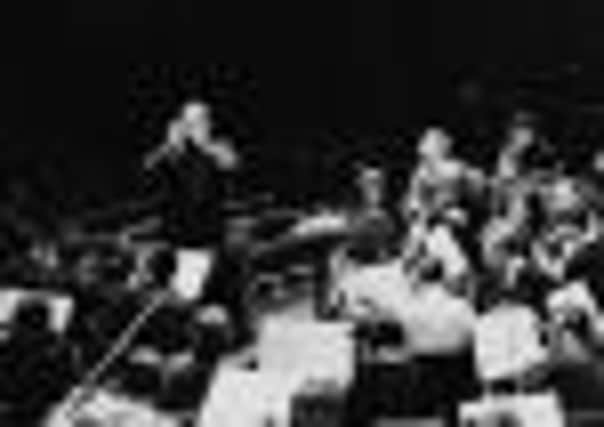Obituary: George Hurst, conductor


George Hurst was a conductor with a wide repertoire who was closely associated with several BBC orchestras. A fine musician, he had the ability to nurture musicians and mould them into a cohesive group. The orchestras with which he held official posts greatly benefited from his knowledge of the intricacies of a score and his skill in interpretation. These qualities are particularly remembered by colleagues at the BBC Scottish Symphony Orchestra, where John Clark (now with the Royal Scottish National Orchestra) remembers Hurst as “a great teacher of conducting. I worked with George at both the BBC Scottish Symphony Orchestra (BBC SSO) and the Scottish National Orchestra (SNO) and at the Royal Scottish Conservatoire. He had a brilliant stick technique and was the best conductor of Hindemith’s Mathis der Maler – which requires great dexterity and skill. The BBC SSO had a great success when he conducted the work at the Proms in London in 1983.”
Hurst was professor of conducting at London’s Royal College of Music and a regular tutor at the Canford Summer School. Many of today’s leading conductors have paid tribute to his incisive teaching. Such maestros as Sir Andrew Davis, John Eliot Gardiner and Mark Wigglesworth were tutored by him as students. However, his greatest influence was, perhaps, on Sir Simon Rattle.
Advertisement
Hide AdAdvertisement
Hide AdSir Simon has recorded that, as an 11-year-old, he had attended a performance of Mahler’s Second Symphony conducted by Hurst, calling it his “Paul on the road to Damascus moment”. He once said: “It’s because of that evening that I’m a conductor.”
Hurst had a Romanian father and a Russian mother. He studied piano and cello in London before he was evacuated to Canada during the Second World War. There, he studied at the Royal Conservatory of Music in Toronto. He was a talented pupil, gaining an award in composition on graduating in 1945. He became professor of composition at the Peabody Institute in Baltimore, Maryland.
To further his conducting career and with the encouragement of the pianist Dame Myra Hess, Hurst moved to Britain, where, in 1953, he directed the London Philharmonic with Eileen Joyce as soloist. The following year he conducted Dame Myra in Beethoven’s Fourth Piano Concerto. Hurst was appointed principal conductor of the BBC Northern Symphony Orchestra (BBC NSO) in Manchester in 1958 – it was a challenging job as the orchestra faced stiff competition from the other Manchester orchestra: the Halle. With his dedication and ability to enthuse his musicians the standard rose considerably and this was evidenced in 1966 when the BBC NSO gave the first Manchester performance of Schoenberg’s demanding epic, Guerrelieder.
Hurst had first conducted the BBC SSO in 1982. It was an orchestra whose reputation he was to build considerably and whose repertoire he expanded while he was chief guest conductor. As well as regular appearances in the concert hall, Hurst made many studio recordings for BBC Radio 3. He led the orchestra on prestigious visits, notably to West Germany in 1986, to Dublin in 1988, and to West Germany, Austria and Yugoslavia in 1990. On these tours, Hurst shared duties with chief conductor Jerzy Maksymiuk.
In 1987, he conducted the BBC SSO at a Prom in the Royal Albert Hall. After Brahms’ 3rd Symphony, Hurst conducted a vivid account of Dvorak’s cello concert played by Mischa Maisky. His final appearance with the BBC SSO was in 1995 for concerts in Ayr and Stirling, which included works by Tippett and Beethoven. The former composer Hurst had studied in detail and made an acclaimed recording of his demanding piano concerto with the BBC SSO and Benjamin Frith as soloist. Hurst also recorded many of the orchestral works of Elgar.
The SNO first booked Hurst in 1957 for an all-Beethoven concert, with Denis Matthews playing the second piano concerto. His last appearances with the SNO were in 1988, when he conducted the orchestra in Dumfries and at that year’s SNO Proms season, when Hurst conducted a thrilling account of Dvorak’s Ninth Symphony.
Hurst had been instrumental in founding the Bournemouth Sinfonietta in 1968 as an offshoot of the Bournemouth Symphony Orchestra. It toured smaller venues but he was often engaged by the main orchestra – memorably conducting them in the first London performance of Malcolm Williamson’s Second Symphony in 1969.
He made his first of 20 Proms appearances in London in 1960, sharing the conducting with Sir Malcolm Sargent. Other concerts there included the UK premiere of Hindemith’s Symphony in E flat and a gripping account of Liszt’s First Piano Concerto with John Ogdon.
Advertisement
Hide AdAdvertisement
Hide AdHurst had developed a great fondness for malt whisky on his return trips to Scotland and was an authority on various blends. He was also an avid sailor. He is survived by his wife, Denise, and by the daughter of one of his earlier marriages.
ALASDAIR STEVEN